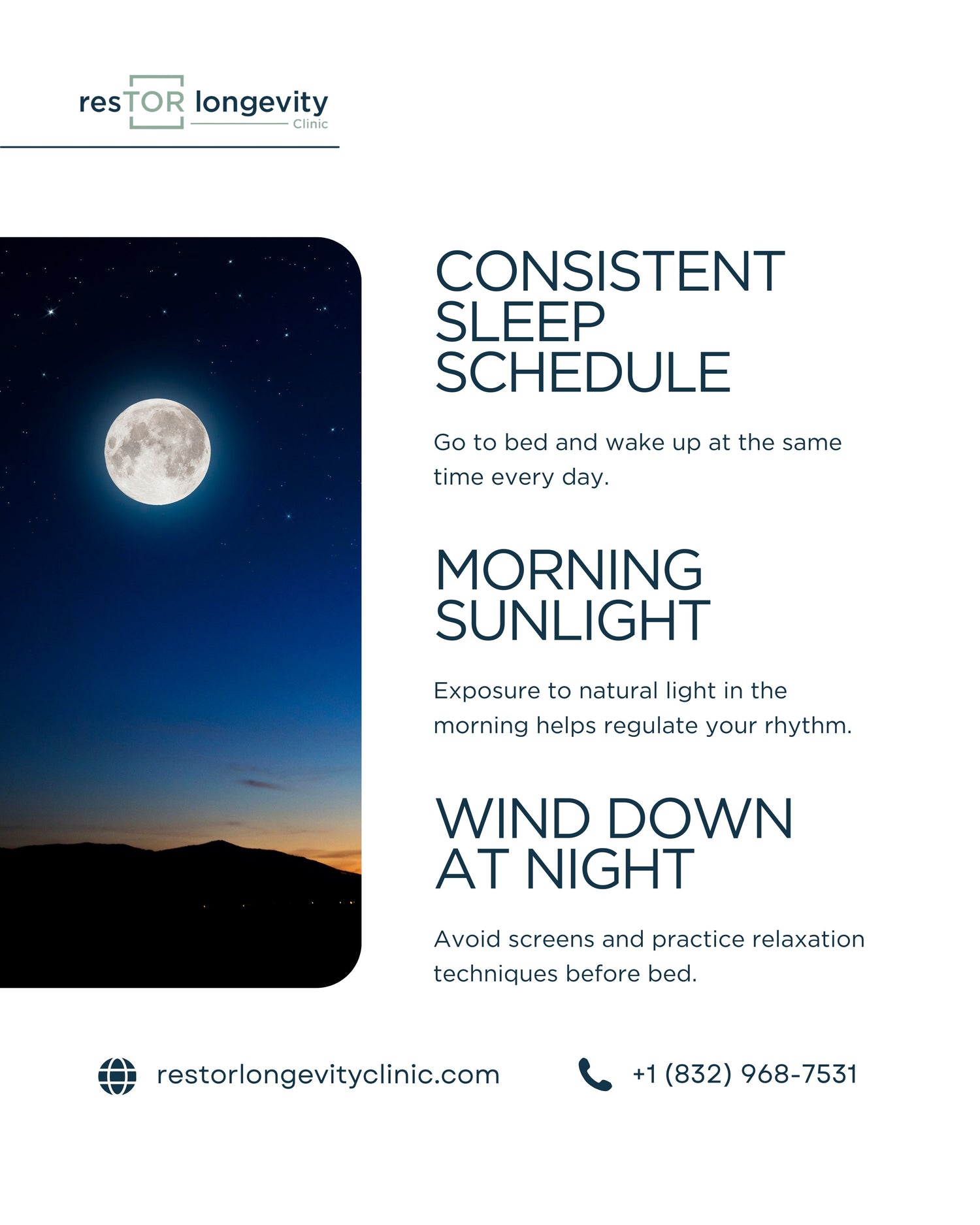Did you know that aligning your circadian rhythm can lead to better energy levels, improved mood, and overall enhanced health? This essential internal clock plays a pivotal role in regulating our sleep-wake cycles and affects various physiological processes. In this guide, we’ll delve into the science behind circadian rhythms and provide actionable steps to achieve a harmonious balance for better health. By the end of this post, you will be equipped with practical strategies that can help you maximize your well-being through optimizing your sleep-wake cycle.
Understanding Circadian Rhythms
Circadian rhythms are roughly 24-hour cycles dictating biological processes in living beings. Regulating sleep patterns, hormonal releases, eating habits, and other bodily functions is crucial for overall health. The term circadian is derived from the Latin words 'circa' (meaning around) and 'diem' (meaning day).
Research shows that our bodies follow these rhythms due to various external cues, primarily light.
The Science Behind Circadian Rhythms
The suprachiasmatic nucleus (SCN), located in the hypothalamus of the brain, is responsible for regulating circadian rhythms. It receives information from the eyes about light exposure and adjusts the body’s biological clock accordingly. This syncs our biological processes with the day and night cycle, optimizing our performance and metabolic functions.
Disruptions in this rhythm can lead to numerous health issues, including sleep disorders, obesity, diabetes, and even cardiovascular diseases. Understanding the importance of circadian rhythms is the first step toward better health.
Benefits of a Well-Optimized Circadian Rhythm
Aligning your circadian rhythm can yield exceptional health benefits:
- Better Mood: Consistent sleep-wake cycles can lead to emotional stability and lower incidences of anxiety and depression.
- Increased Energy Levels: Regular sleep patterns foster more restorative sleep, resulting in higher energy during waking hours.
- Improved Cognitive Function: Adequate rest strengthens memory, enhances attention, and boosts creativity.
- Weight Management: Adequate sleep helps regulate hormones related to appetite control, avoiding fluctuations that contribute to weight gain.
- Enhanced Immune Function: Aligning your rhythm with natural cycles improves immune system efficiency, making you better prepared to fend off illnesses.
Key Strategies to Optimize Your Circadian Rhythm
Now that we understand what circadian rhythms are and the benefits of getting them right, let’s explore effective strategies you can implement to enhance your health through circadian optimization.
1. Establish a Consistent Sleep Schedule
Setting regular sleep and wake times is the cornerstone of a healthy circadian rhythm. Your body thrives on routine. Here’s how to establish one:
- Go to bed and wake up at the same time every day, even on weekends.
- Aim for seven to nine hours of quality sleep each night.
- Gradually adjust your schedule if you need to shift your sleeping hours, by 15 to 30 minutes each night.
2. Prioritize Morning Sunlight Exposure
Light plays a crucial role in regulating your sleep-wake cycles. Here’s how to leverage this natural touchstone:
- Get outside for at least 30 minutes every morning.
- If natural sunlight isn’t accessible, consider investing in a light therapy box that simulates natural light.
- Dim the lights in the evening to cue your body to prepare for sleep.
3. Wind Down Before Bed
Creating a calming bedtime routine can help signal to your body that it's time to relax. Try these tips:
- Limit screen time (computers, smartphones, televisions) for at least an hour before bed, since blue light can interfere with melatonin production.
- Engage in relaxing activities such as reading, meditating, or light stretching.
- Consider implementing a bedtime routine that includes practices such as journaling or herbal tea to prepare your body for restful sleep.
4. Stay Active Throughout the Day
Regular physical activity is beneficial not only for general health but also for regulating your sleep patterns. Consider these steps:
- Aim for at least 150 minutes of moderate-intensity activity weekly, such as brisk walking, cycling, or swimming.
- Avoid exercising too close to bedtime, which can lead to increased energy and difficulty falling asleep.
5. Mind Your Meals
What you eat and when you eat can significantly affect your circadian rhythm. Here's how to align your meals with your body’s needs:
- Try to consume your largest meals earlier in the day, as digestion can interfere with sleep.
- Avoid heavy meals and stimulants such as caffeine at least three hours before bedtime.
- Stay hydrated but limit fluid intake close to bedtime to reduce nighttime awakenings.
6. Limit Napping
While short naps can be beneficial, especially if you are sleep-deprived, long or irregular napping during the day can hinder your circadian rhythm. Here’s how to manage naps:
- Keep naps to 20-30 minutes to prevent sleep inertia after waking.
- Limit daytime napping to avoid interfering with nighttime sleep.
7. Monitor Environmental Cues
Creating an environment that promotes better sleep can significantly impact your circadian rhythm. Here are adjustments to consider:
- Use blackout curtains to block light from entering your bedroom at night.
- Control noise with earplugs or a white noise machine if you live in a noisy area.
- Maintain a comfortable and cool room temperature for optimal sleep quality.
8. Use Technology Wisely
While technology can pose challenges to circadian rhythms, it can also help. Consider these tips:
- Use apps or devices to track your sleep patterns.
- Set reminders for sleep schedules and other health-related activities.
-also install blue light filters on screens when using them in the evenings.
Common Misconceptions About Circadian Rhythms
There are several misconceptions about circadian rhythms that can lead to confusion. Here are a few:
- Everyone has the same rhythm: Circadian rhythms can vary among individuals, with night owls needing different strategies than early risers.
- Circadian rhythms only affect sleep: They influence all biological processes, including digestion, hormone production, and even energy metabolism.
- You can 'catch up' on sleep: Although you may recover some rest after a sleep deficit, frequent disruptions can lead to chronic problems and aren't recoverable.
Recap: Optimizing Your Circadian Rhythm for Health
Taking the initiative to optimize your circadian rhythm can inspire profound changes in your life. Not only can it boost energy levels and improve your mood, but it can also enhance overall health. Incorporating regular sleep schedules, morning sunlight exposure, a calming nighttime routine, and balanced activity levels into your daily life will greatly improve your well-being.



